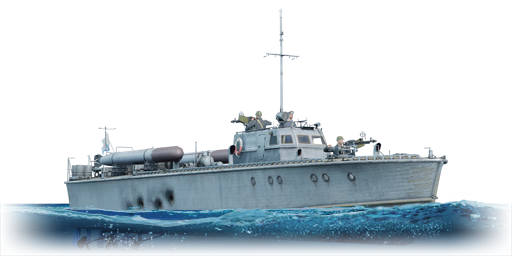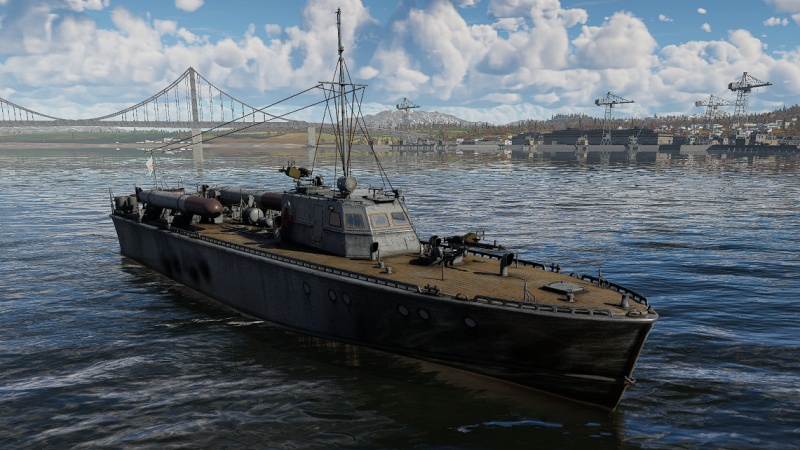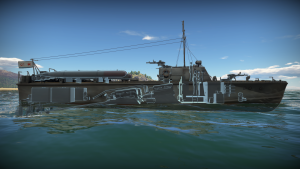D-3
Contents
Description
The D-3 Motor Torpedo Boat was developed by the Soviet Navy to replace the G-5 in the middle of WW2. It featured improved endurance and firepower compared to the G-5. The D-3 boasted two 12.7 mm DShK machine guns instead of one, along with the ability to carry depth charges alongside the torpedoes. Some of the D-3 boats were reported to be fitted with lend-lease 20 mm Oerlikon autocannons. In 1942, the Soviet Navy introduced an improved version of the D-3 hull, with a modified internal layout and additional engines. Subsequently, in November 1942, the sub-chaser variant of the improved D-3 hull, known as the OD-200, entered production and served with the Soviet Navy until the late 1950s.
The boat was introduced during Update 1.79 "Project X" when the Soviet fleet was implemented into the game. Its armament consists of two 12.7 mm DShK machine guns, two 533 mm 53-38 torpedoes, and four BB-1 depth charges. Its gameplay resembles that of other MTBs in this BR, primarily utilizing machine guns to destroy enemy boats and using torpedoes and depth charges only in certain situations. While this boat is not as fast as its predecessor (G-5), it can break through strategic points thanks to its two heavy machine guns.
General info
Survivability and armour
Armour is practically non-existent, as the D3 is constructed entirely out of wood. All three engines are also located in the centre of the vessel, making it quite easy to knock out. Crew consists of 9 men.
Mobility
The D-3 can reach speeds over 80 km/h in AB and 59 km/h in RB and SB. It is swift, and also very mobile - you can make very sharp turns, due to the quick rudder re-routing speed. The reverse speeds are not bad, reaching a maximum of -28 km/h. Although, you shouldn't be going backwards, because it usually takes a lot of time just to come to a stop; it's much safer to make a forwards U-turn.
| Mobility Characteristics | |||
|---|---|---|---|
| Game Mode | Upgrade Status | Maximum Speed (km/h) | |
| Forward | Reverse | ||
| AB | |||
| Upgraded | |||
| RB/SB | |||
| Upgraded | |||
Modifications and economy
Armament
Primary armament
Primary armament consists of two 12.7 mm DShK machine guns with one located at the bow of the ship and the other one at the centre of the ship allowing for engagement in all 360° directions. However, due to structural designs, only one gun can be pointed towards at either the bow or aft of the ship. Reloading the DShK takes about 4.7 seconds and can reliably engage targets up to 1.8 km away. With its 12.7 mm bullets, the D-3 can reliably knock out enemy vessels in the same class and maybe even larger vessels if given enough time. Available ammunition belts include the high explosive incendiary (HEI) and armour piercing incendiary tracer (APIT) rounds.
- Universal: AP-I · API-T · IAI
- 12.7 mm HE belts: IAI · IAI · IAI · API-T
- 12.7 mm APIT belts: API-T · AP-I · IAI · AP-I
| Penetration statistics | |||||||
|---|---|---|---|---|---|---|---|
| Ammunition | Penetration @ 0° Angle of Attack (mm) | ||||||
| 10 m | 100 m | 500 m | 1,000 m | 1,500 m | 2,000 m | ||
| AP-I | 30 | 29 | 25 | 21 | 18 | 15 | |
| API-T | 29 | 28 | 24 | 20 | 17 | 14 | |
| IAI | 3 | 2 | 2 | 2 | 2 | 2 | |
| Shell details | ||||||||||||
|---|---|---|---|---|---|---|---|---|---|---|---|---|
| Ammunition | Velocity (m/s) |
Projectile mass (kg) |
Fuse delay (m) |
Fuse sensitivity (mm) |
Explosive mass (TNT equivalent) (g) |
Ricochet | ||||||
| 0% | 50% | 100% | ||||||||||
| AP-I | 850 | 0.05 | - | - | - | 47° | 56° | 65° | ||||
| API-T | 850 | 0.05 | - | - | - | 47° | 56° | 65° | ||||
| IAI | 850 | 0.05 | 0 | 0.1 | 1.5 | 47° | 56° | 65° | ||||
Additional armament
The D-3 carries two, front facing, 533 mm 53-38 torpedoes located at the stern of the ship. The torpedoes are rather accurate with a default travel distance of 4 km and a good speed of 82 km.
Once unlocked, the D-3 can carry four BB-1 depth charges located at the stern of the ship, which is also where they are dropped when deployed.
You can set the Depth Charge activation time before spawning in if you are carrying depth charges. You can select activation times from 3 to 10 seconds, but it's recommended to set it to something in the middle (5-8s), to keep your options open.
Usage in battles
The D-3 is a very strong beginner torpedo boat for lower rank battles and can compete quite well with other ships at its BR. However, note that the ship itself has some quirks and flaws which should be remedied to succeed in battle. The ship's main armament consists of two single 12.7 mm DShK machine guns, which represent a significant upgrade over the reserve G-5 torpedo boat. As well, the ship can carry two 533 mm torpedoes that can easily shred any ship. The D-3 does have mediocre mobility for a small torpedo boat, but it is certainly enough to get the ship where it needs to go. Finally, the ship's survivability is decidedly terrible (though average for motor torpedo boats at its BR) meaning that you should try to utilize ambush tactics to maximize the ship's survivability.
At the start of each battle, your first priority should be to capture points. However, rushing straight into points isn't the greatest strategy for the D-3. This is because the D-3 has relatively worse agility when compared to faster MTBs such as the G-5, meaning that it cannot reach capture points nearly as quickly. As a result, one good potential strategy is to flank and find island cover, allowing you to use ambush tactics against enemy ships. The D-3 is not survivable and will get ripped to shreds by any gunfire, rifle-calibre and above. Thus, the best strategy is to not get hit, meaning that island cover is critical for preserving your ship's survivability.
Against smaller boats, try to ambush and destroy them as quickly as possible using the DShK machine guns, which can get the job done very quickly. Against larger vessels, the best strategy is to avoid direct engagement, as the D-3 will get ripped apart far quicker than it can destroy larger vessels. Seeking the assistance of teammates is very helpful, as well as a smokescreen which can be used for a fast getaway. The D-3 does carry torpedoes, but these weapons are not efficient against coastal vessels, meaning that it may be more efficient to leave them off the ship ; after all, the torpedoes can be detonated leading to a fiery death.
Pros and cons
Pros:
- Turret placement allows the D-3 to engage in targets all around itself
- Two DShK machine guns, which are highly effective against smaller targets
- Small and decently fast, meaning that it is relatively difficult to kill at longer ranges
- Gets access to torpedoes, which can be used against targets that the guns cannot knock out
Cons:
- No armour at all and just 9 crew members, making it very easy to knock out
- Vulnerable to aircraft due to no dedicated anti-air and weak vertical guidance on its guns
- Only one gun can operate on targets right in-front and behind the craft
- While still good, mobility is relatively mediocre compared to its contemporaries
History
The D-3 was a class of Soviet Motor Torpedo Boats (MTBs) built during the Second World War as a replacement to the prior G-5 class. The ship was designed as an incremental improvement to the G-5, featuring improved endurance and main armament. In total, 73 D-3 class torpedo boats were produced, operating during the Second World War alongside its predecessor and successor classes, the G-5s and Pr. 123bis.
The Soviet Navy aimed to resolve several of the G-5's main issues with the D-3 motor torpedo boat. Namely, the G-5 had a small main armament and short range of just 354 km (220 miles). The D-3 was thus much larger than the G-5 and carried reinforced armament. The ships had a significantly longer range of 560 km (350 miles), and featured a second DShK machine gun compared to the G-5's single DShK gun. The ships also carried two 533 mm torpedoes in open mounts, instead of the G-5's rear trough torpedo configuration. Finally, the D-3s were designed to carry eight depth charges for anti-submarine warfare.
However, this came at the expense of speed - the initial production D-3s, powered by three gasoline engines producing 2,550 hp, were only capable of making 32 knots (59 km/h). Later versions of the D-3 remedied this problem by using lend-lease Packard engines developing a total of 3,600 hp, allowing for a top speed of 45 knots. In total, 73 D-3 class torpedo boats were built, of which 26 boats were of the original engine configuration. These ships were built between 1940 and 1941, while the remaining re-engined ships were built between 1943 and 1945. Of the 73 D-3s built, 28 ships were lost in service, the remainder serving with the Soviet navy into the 1950s.
Media
- Skins
See also
Links to articles on the War Thunder Wiki that you think will be useful for the reader, for example:
- reference to the series of the ship;
- links to approximate analogues of other nations and research trees.
External links
Paste links to sources and external resources, such as:
- topic on the official game forum;
- other literature.
| USSR boats | |
|---|---|
| Motor torpedo boats | D-3 · G-5 · G-5 (ShVAK) · Pr.123-bis · Pr.123K (A-10bis) · Pr.123K · Pr.183 |
| Motor gun boats | TKA-412 · MO-4 · OD-200 · Pr.253L · Pr.183 BM-21 · Ya-5M |
| Motor torpedo gun boats | Pr. 206 · Pr.206-M · MPK Pr.12412 · MPK Pr.12412P · MPK Pr.11451 |
| Gunboats | Groza |
| Armoured gun boats | BMO · MBK-161 early · MBK-161 late · MBK pr.186 · MBK pr.186 (MK 85) · Pr.1124 early · Pr.1124 late · Pr.1124 MLRS |
| Pr.191 · Pr.191M · Pr.1204 · Pr.1204 late | |






